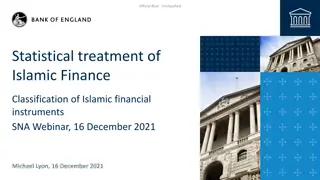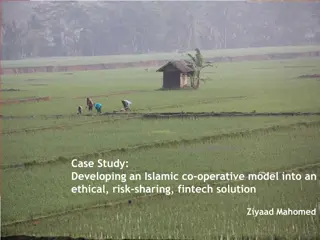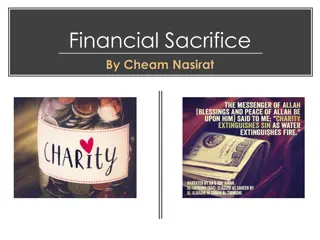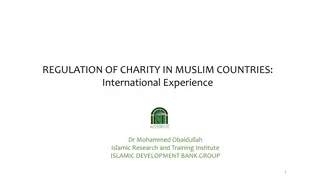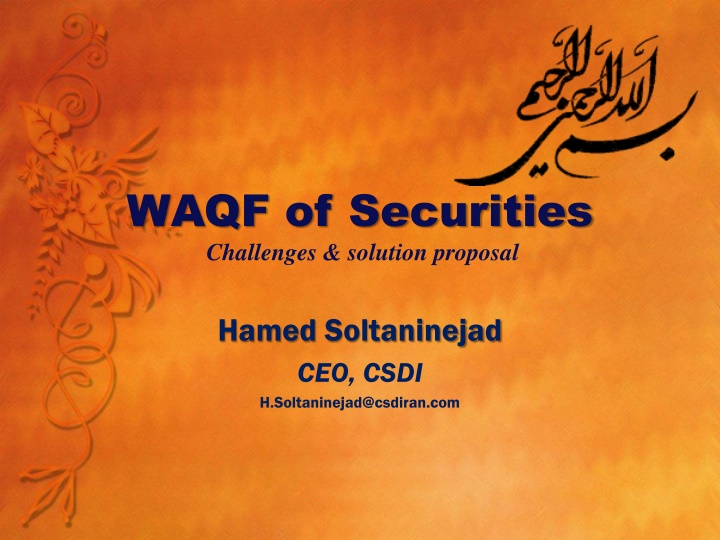
Challenges and Solutions in Waqf of Securities
Explore the challenges, controversial issues, and best practices in waqf of securities, along with proposed solutions for efficiency and sustainability in capital markets.
Download Presentation

Please find below an Image/Link to download the presentation.
The content on the website is provided AS IS for your information and personal use only. It may not be sold, licensed, or shared on other websites without obtaining consent from the author. If you encounter any issues during the download, it is possible that the publisher has removed the file from their server.
You are allowed to download the files provided on this website for personal or commercial use, subject to the condition that they are used lawfully. All files are the property of their respective owners.
The content on the website is provided AS IS for your information and personal use only. It may not be sold, licensed, or shared on other websites without obtaining consent from the author.
E N D
Presentation Transcript
WAQF of Securities Challenges & solution proposal Hamed Soltaninejad CEO, CSDI H.Soltaninejad@csdiran.com
CSDI FUNCTIONALITIES Clearing and Settlement Registry Corporate Actions Risk Mgnt Central Securities Depository of IRAN
OUTLINE Introduction to waqf Waqf functions Efficiency challenges of traditional waqf Controversial issues in waqf Waqf in capital markets Challenges and opportunities Best practices Capital market considerations Proposed solutions
INTRODUCTION TO WAQF Definition of Waqf To stop, contain or to preserve. Voluntary, permanent, irrevocable dedication of Wealth to Allah. The waqf is a system that stems from the idea of institutionalizing voluntary giving in order to guarantee sustainability. ..A waqf is Sadaqah Jariyyah, continuing charity A Capital Gift to Allah.
INTRODUCTION TO WAQF Forms of Waqf Economic Assets : Income producing assets Yields or manfaat Social Assets: fixed or capital assets Principal itself or eine
INTRODUCTION TO WAQF General types of waqf Religious waqf :Mosques and real estates confined for providing revenues to spend on mosques' maintenance and running expenses the category of religious waqf. Philanthropic waqf: It aims at supporting the poor segment of the society and all activities which are of interest to people at large such as libraries, scientific research, education, health services, care of animals and environment, lending to small businessmen, parks, roads, bridges, dams, etc. Family waqf: waqf for one's own family and descendants.
C CHARACTERISTICS HARACTERISTICS OF OF WAQF WAQF Perpetuity : remaining waqf for ever Permanence of stipulations of waqf founder: fulfillment of conditions specified by the founder Management of waqf: mutawalli as administrator
WAQF FUNCTIONALITIES Economic Roles Social Roles Wqaf institution Islamic financial modes for awqaf Role in poverty alleviation Making synergy Social Entrepreneurship
CHALLENGES OF TRADITIONAL APPROACH Inefficiency Development Barriers Moral Hazards (due to lack of transparency) Weaknesses Mainly old and existing waqf prosperities Government control and centralization Two narrowly focus on mosque and school Trustee (Mutawalli) weaknesses
NECESSITY OF AUGMENTATION Reforming the management Reconstructing the procedure (ijtihad) Corporate governance structure Waqf literacy improvements
CONTROVERSIAL ISSUES Property substitution(Ibdal and Istibdal) Different views Prevention(habs) of principal or properity itself (Ein) Cash Waqf (credit waqf) Waqf of securities Waqf of other financial instruments
WAQF OF SECURITIES Different Approaches Shariah Compliance Solutions Consensus Approach
PREVIOUS EFFORTS IN SECURITY WAQF Cizakca: Incorporated cash waqfs and mudaraba, Islamic non-bank financial instruments from the past to the future Elgari: Waqf-based microfinance: Realizing the social role of Islamic finance Kahf: Innovative modes for financing the development of waqf properties
INNOVATIVE METHODS Current Situation in I.R. Capital Market Account for principal Account for yields Innovative Methods Revitalization of waqf Sukuk AL- INTIFA'A Sukuk AL- Mosharake
MUSHARAKAH TRANSACTION MECHANISM Waqf Asset Manager (WAM) enter into lease agreement with ABC Property Management including 2 years forward lease Waqf Asset Manager Developer WAM and Special Purpose Company (SPC) enter into a musharakah venture to develop waqf land for a period of say 6 years profit sharing ratio determined 70:30 Period profit (30%) 1.Wakaf land 4. Undertakes to buy Musharaka share on periodic basis A B C Lease/ forward lease WAM Contribute land to the mushatakah Musharakah Investor SPC Contribute cash as capital to build commercial building on the waqf land Period profit (75%) 2b.Capital 2a.Capital The musharakah appoints the WAM as an agent to develop the land. The WAM may appoints developer to build the building, then when it was ready to lease the building ,the return will distributed according to the ratio SPC 3. Issue Sukuk Musharakah + periodic profit The WAM will undertakes to buy at pre-agreed price the musharakah shares of the SPC on periodic basis and at the end of 6 years, then SPC would no longer have any shares in the musharaka Sukuk
MUTUAL FUNDSAS WAQF CARRIERS Mutual fund specifications Mutual and securitized Comparable with market performance Professional management Attractiveness Better supervision Suitable for new waqf projects
MUTUAL FUNDS WAQF Models 1. Waqf of cash 2. Waqf of mixed cash and securities 3. Conditional waqf of securities Challenges of Models 1. Rare acceptance of Jurisprudents (shaz) 2. 2& 3 some Jurisprudents don't believe holistic Ibdal and Istibdal
INVESTMENT FUNDS WAQF Opportunities Better Portfolio management by professional mutawalli (trustee) Feasibility of ibdal and istibdal Better Administration and supervision Joining benefits of securitization Challenges Again challenge of Ibdal and Istibdal Necessity of different funds for different purposes Prevention of fund s share transaction Mandatory listing of public investment funds in some countries
COMPARISONOF PROPOSALS Proposal Two accounts Challenges Decreases the market liquidity Corporate governance problem Misuse of accounts Risk of delisting Restricted Ibdal and istibdal Necessity of conditional waqf Restricted Ibdal and istibdal Mutual Funds Investment Funds

